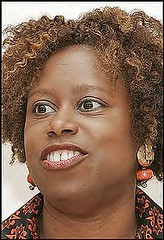Indictment Rejected For Rep. McKinney
Police Union to Study Legal Options
By Eric M. Weiss and Petula Dvorak
Washington Post Staff Writers
Saturday, June 17, 2006; B04
A D.C. grand jury has decided not to indict Rep. Cynthia McKinney (D-Ga.) for scuffling with a U.S. Capitol Police officer this year.
U.S. Attorney Kenneth L. Wainstein issued a statement yesterday saying the decision followed "an extensive and thorough" investigation by a D.C. Superior Court grand jury. The grand jury filed notice with the court that the evidence did not support an indictment, a move that Wainstein said will end the investigation.
"I am relieved that this unfortunate incident is behind me," said McKinney, 51, a six-term House member. "I accept today's grand jury finding of 'no probable cause' as right and just, and the proper resolution of this case."
McKinney said she will be pleased to continue working
"without this cloud hanging over me."
The outcome disturbed individual Capitol Police officers, who indicated that they expected McKinney to face charges in a March 29 incident that quickly generated national attention.
However, the Capitol Police department issued a statement last night saying it respected the grand jury's decision and appreciated what it termed an extensive and thorough investigation by the prosecutor's office. The department commended what it described as the professionalism of the officer involved. In the statement, the department also said the matter was diligently presented to the grand jury.
In the March 29 incident, McKinney sidestepped a Longworth House Office Building metal detector -- as House and Senate members are allowed to do. But she was not wearing her lapel pin identifying her as a member, and a police officer -- who did not recognize her -- grabbed her after she ignored his commands to stop. That was when she was alleged to have hit him in the chest.
McKinney, who is black, at first complained that she was a victim of racial profiling and accused the white officer, Paul McKenna, of inappropriately touching her. She also had dubbed the incident "much ado about a hairdo," saying that a hairstyle change this year may have made it harder for police to recognize her.
Capitol Police, meanwhile, urged the U.S. attorney's office to charge McKinney with simple assault, a misdemeanor. Prosecutors chose instead to have the grand jury review the case, and the panel heard testimony from officers and other witnesses.
Even hours before the decision was announced, police expected to hear that McKinney would be charged, said Lou Cannon, president of Fraternal Order of Police Lodge 1.
"We think the facts clearly speak for themselves in this case," Cannon said. "Our initial obvious reaction is disappointment and concern about the message this sends to America."
The police union plans to meet over the weekend to discuss strategy and determine whether it has further legal avenues. It plans to hold a news conference Monday to announce its proposals, Cannon said.
McKinney's attorney, James W. Myart Jr., said the decision not to file charges vindicated McKinney's view that she had broken no laws. "All along, the position has been that she did not commit a crime," said Myart, a civil rights lawyer from San Antonio.
After her initial accusations that Capitol Police were to blame for the controversy, McKinney took a different tack. Eight days after the episode, she took to the House floor and apologized to her colleagues. Last month, she signed onto a resolution commending the Capitol Police force for its courage and professionalism. And this month, she was spotted schmoozing with officers outside the Cannon House Office Building.
Prosecutors declined to say whether they asked the grand jury to return an indictment, noting court rules that bar them from disclosing such matters.
Two former federal prosecutors said Wainstein's use of a grand jury gave him a good read on community sentiment.
Joseph E. diGenova, a former U.S. attorney for the District, said using a grand jury to investigate was smart in this case, where there is an incident that is "politically charged, with racial overtones, and involves a public official in an embarrassing and unfortunate set of circumstances."
Eric H. Holder Jr., another former U.S. attorney who later became deputy attorney general, recalled using a grand jury to investigate a 1996 incident in which a school principal shoved a newspaper reporter. In that case, a grand jury decided to return charges.
"When you present a case to a grand jury, you are essentially letting the community decide how it views the subject matter," Holder said.
Staff writer Martin Weil contributed to this report.

No comments:
Post a Comment